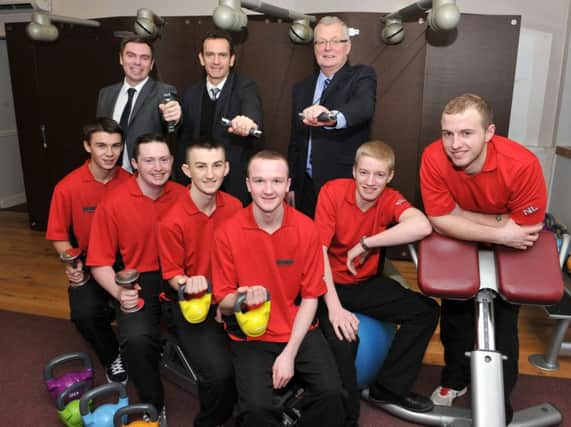Helping our young people get a head start in work


The help we offer our young people in getting a head start in their working lives has recently received a great deal of attention.
It’s in all our interests to ensure that when people enter the workforce, regardless of age or level of education, they do so with a firm grasp not only of their own potential and capabilities but of the opportunities open to them for a successful and rewarding career.
Advertisement
Hide AdAdvertisement
Hide AdAs the Scottish Government’s Youth Employment Strategy outlines, one of the key ways of doing this is to develop a close working relationship between education and enterprise.
This has benefits for everyone. Young people attain a deeper understanding of the skills and conduct required for the world of work. Employers gain access to a potential workforce that is more engaged and better equipped to excel.
It is with this in mind that Skills Development Scotland (SDS) hosted Learning Through Work Week between 16 and 20 November.
The concept was a simple one. Bring businesses, training providers, Modern Apprentices and schools together so pupils can hear firsthand about the opportunities available to start their careers. Careers advice research is clear on the power of hearing from an employer directly.
This is a huge undertaking but one which SDS is uniquely placed to coordinate, harnessing the combined power of our employer engagement team, our careers advisers and their network of contacts across Scotland, and I’m pleased to say the response was phenomenal.
More than 300 schools were involved in activity through the week, with SDS linking them up with local employers, offering pupils the unique chance to ask questions directly and find out more about opportunities on their doorstep.
Many schools embraced the concept. In East Dunbartonshire, Kirkintilloch High ran a series of sessions for pupils with a whole host of employers including Aviva, Microcom Training and the CITB.
The Sir E. Scott School on the Isle of Harris showed location was no barrier, inviting employers including Clyde Marine Training, Harris Tweed, SSE and QinetiQ to the Harris Careers Convention where they met with school students.
Advertisement
Hide AdAdvertisement
Hide AdIn Inverness we joined forces with Highland Council for a skills show, which attracted more than 1,000 people.
RBS helped us launch the week at Craigmount High School in Edinburgh, having recently recruited 40 Modern Apprentices, a number the banking giant is set to double with help from our apprenticeships.scot website, now the go-to site for advertising and finding apprenticeship vacancies across Scotland.
The success of the week is proof of the willingness of employers and schools to work together to ensure meaningful careers experiences for young people, helping them make informed choices about their future.
Furthermore, this was only one aspect of a week-long programme of activities.
Scotland’s Modern Apprenticeship Awards was held in Edinburgh on 18 November, celebrating the achievements of both individuals and employers.
Seeing the reaction of Scotland’s Modern Apprentice of the Year, Laura Burdin, when she learned she had scooped the top award, brought home to everyone present the impact that Modern Apprenticeships have on the lives of young people.
On the night, principal awards partner CGI also announced that we’ll be working together with a number of universities on the first graduate apprenticeship in digital skills, offering a degree level qualification.
The global IT company will fund at least 20 graduate-level apprenticeship starts over the next two years – part of activity being undertaken by SDS to address the skills shortage faced by the growing digital sector.
Advertisement
Hide AdAdvertisement
Hide AdIt was a topic raised at SDS’s Symposium: Leadership in Work-based Learning, the following day.
We were honoured to have the CGI’s Public Sector Scotland Director Maggie Morrison leading a discussion panel at the event in University of Strathclyde’s Technology & Innovation Centre.
We were joined by experts from across Europe, including Clemens Wieland of the Bertelsmann Foundation and François Garçon, senior lecturer at the Sorbonne University in Paris. They each highlighted the hugely successful integrated workbased learning systems in Germany and Switzerland. Both countries enjoy some of the lowest youth unemployment rates in the developed world, credited to their world-class, work-based learning approaches.
At SDS we are already learning the lessons set by the Germans and Swiss. Along with graduate level apprenticeships, integrated work based learning opportunities in the senior phase of school are key.
Our Foundation Apprenticeships are a huge step forward in this respect. Starting on S4 or S5, they take two years to complete and are part of subject choices.
Ten thousand young people are expected to have started a Foundation Apprenticeship by 2020 covering a range of jobs from Construction and Financial Services to Children & Young People and Software Development.
Change won’t happen overnight, but Learning Through Work Week showed once again attitudes to apprenticeships and work-based learning in Scotland are already shifting, as more and more young people and businesses recognise their value.
• Graeme Waddell is a board member with Skills Development Scotland
SEE ALSO